Bulgaria Blog 1. Sofia and Mezdra.
If I had been looking for any warmth and sunshine for my first trip of 2009, then I should have chosen better than Bulgaria. While spring seems to be creeping into England, cold winds and wintery weather means one still needs warm clothing for this trip.
Still, midweek football fixture lists in Bulgaria are unusual, and the coincidence of a set of fixtures, and being free from commitments at work . At least one bargain airline flies to Bulgaria from the UK, but the fares offered by BA and Bulgaria Air are competitive. I chose to fly out BA (sampling the delights of Terminal 5, Heathrow for the first time) and return with the Bulgarian airline arriving slightly earlier back to Heathrow and making transferring to an evening game that much easier.
The journey out was straight forward. Terminal five, as it turns out is just another average airport terminal, consisting of shops, restaurants, and places where aeroplanes park. Our plane did not find a parking space, though, and we had to be bussed out to it. A three and a half hour flight meant it was long enough for BA to give out a reasonable meal, rather than just a filled roll, but I failed to consider checking in by computer, losing any chance of a window seat.
Contrary to what at least one friend had told me, the taxis in Sofia are not a complete rip off, most of those we tried to use happily worked to the meter. There are a few bad ones though, and they tend to congregate outside the railway station, where one offered to take us to the city centre for 15 lev (£7.50) when the metered figure would be just 3 Lev. As it was at least 2pm by the time we had cleared customs, and the day’s match kicked off at 3.30, we decided to head straight to the stadium our driver did manage to get ‘confused’, trying to take us to the Vassil Levski Stadium, rather than Georgi Asparuhov Stadium where Levski actually play. The Vassil Levski stadium is the national stadium, but is also always the venue for the ‘derby’ matches between Levski and CSKA.
Not surprisingly for a midweek afternoon match, the crowd was not massive, but then large crowds are not a feature of Bulgarian football.
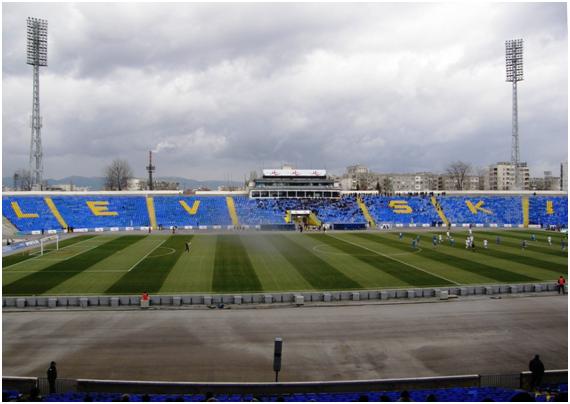
Tickets for the main stand cost 4 Lev (about £2) and those that made it into the ground, choose either this area, or one block behind the goal, with spectators elsewhere being very thin on the ground. The security presence was large though, and unlike on my previous visit to Bulgaria, they were all full scale jobsworths, not allowing me out of my own section to take photos or collect a team sheet. I struck lucky with the latter, collecting one from a radio reporter on my side of the ground. As for pictures, I got this it is not possible to see the wording on the seats, but it again says Levski, except in this case, in Cyrillic script.
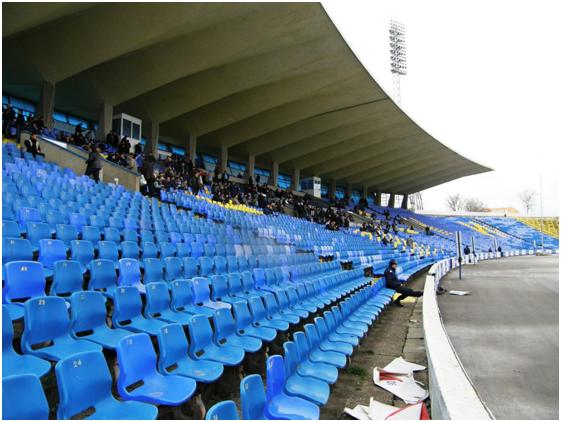
If you look closely enough, you can just see some of the effect of bolting plastic seats onto concrete that is not in the best of condition. Almost every seat in the section has a notable lean forward, making them feel quite strange to sit on. The row of flagstones nearest the wall conceal a drain or more to the point, they do not conceal it, with some stones missing, allowing the unsuspecting visitor to fall into the hole. Several Bulgarian grounds have been closed for periods this season, as work has been done to bring them in line with new licensing regulations. This one, with its uneven seats and crumbling paths was one that benefitted from staging some of the games that had to be moved!
As for the game, it was open and quite entertaining; the majority of the Bulgarian national team have left the country and are spread out across Europe (three in England) and even the World (one in Japan), but two of the remainder, Zhivkov Milanov and goalkeeper Georgi Petkov were playing for the home team. Both teams had a fair sprinkling of incoming players, including a Macedonian each, a Moroccan playing for the home side, Marcio Nuno of Portugal for the away side and a fair sprinkling of Brazilians. One of these, Lucio Wagner of Levski has been in Bulgaria long enough to become a citizen and had played for the Bulgarian side. For Chernomorets, the Bulgarian answer to Michael Platini appears to be the Brazilian Michel Platini Mesquita, who played the loan striker role. Prior to playing in Bulgaria, he was with Brazilain third division side Araguaina and had also played in Hong Kong.
One refreshing aspect was that despite a formation with just one player up front, the visitors, Chernomorets Burgas did not set out merely to frustrate the league leaders with the hope of grabbing a point, but attacked freely, especially in the early part of the game. It was just before half time when Levski went ahead but their fans were then silenced early in the second half, when Bozhilov’s short range header levelled the scores. Levski regained the lead around the hour mark, and after a series of substitutions meant all the original goal scorers had left the pitch, it was left to a substitute, and another Brazilian, ze Soares to complete the scoring a few minutes before the end.
With CSKA also winning their game 3-1, Levski retained their single point lead over their city rivals for the title.
It was only after the game that we got into Sofia, the Lion hotel providing reasonable accommodation at a convenient ten minute walk from the railway and bus stations. It took about half an hour to find our way to the central cathedral, and then down a small side street to the Pri Kmeta, (in English, it would be the Mayor’s pub), which is the only microbrewery I have heard of in Bulgaria. Paul (who travelled with me this week) and myself particularly liked the Red beer, while the food is reasonably priced and generally edible.
The following day we travelled up to Mezdra our reasoning was that of the two matches available to us Lokomotiv Mezdra against Minyor Pernik (at 15.30) and Litex Lovech against Pirin Blagoevgrad in the evening this would be the easier to visit, and would also make the next leg of our journey easier a
s well. We were to find ourselves with a similar choice on the final day of the tour, as the two away teams from this day, Minyor Pernik and Pirin Blagoevgrad, were both at home at 15.30.
The journey to Mezdra is only about 90 minutes on a “fast” train, which clatters around as it follows the valley of the Iskar river. For a total journey under 100 km, the word fast seems misplaced.
Immediately on our arrival, we spied the football ground, to the right as the train approached the town the town itself was to the left with no sign of a way to cross either the railway, or the river! It turned out that although the ground was within 200 yards of the station, we would have best part of a mile to cover to find a bridging point. First we took the chance (but not for long) to look at the town the name apparently means “empty and deserted place” and so it was until the railway arrived. The population was under 100 in 1897, but is now 13,000. A clear demonstration of just how ugly a town can spring up, if you have a railway junction, and little else to start with . The centre of the town is a gray and lifeless square (ok, the weather was very cold, it may be better in the summer), with an anonymous block on one side apparently providing the town’s only hotel and restaurant. We went in their first to ask for a map. There was no one there.
To one end of the town, a pretty orthodox church provides the only ‘site’, while the road from the church to the centre has a wide green central reservation, filled with inexplicable sculptures. We ended in a small café back in the square where we could shelter from the biting wind.
Around two o’clock, we discovered the home fans had gathered in another café, by the station and we then followed in their wake (about 100 of them) as they made their way to the stadium with a police escort. It all seems a little over the top (considering the small crowds), with the away fans arriving later, being escorted in and never allowed contact with the home ones but there is a recent history of crowd trouble in Bulgaria, and several clubs have had their grounds closed for short periods.
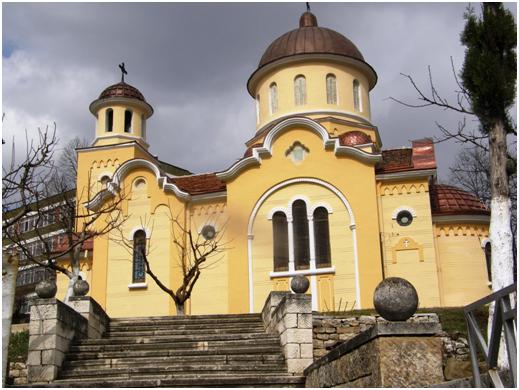
The football team won promotion to the top flight for the first time this season, and are performing well enough to finish mid-table this time around. The stadium consists of an open shelf of seating on one side, making use of the natural hill side. As at Levski, the seats have an uneven feel, having been bolted onto crumbling concrete. The away fans are securely penned into an enclosure behind the goal, while the only cover is a small building that contained the dressing rooms, a small VIP area, and a press stand. Having paid 5 Lev to enter, I approached the press area to get the team lists (this time in Cyrillic, whereas Levski had only provided them in Latin characters). I could have watched from there, but in the end choose the main stand, as the viewing angles were better.
Several of the teams in Bulgaria are called Lokomotiv, and all seem to share some common heritage from this, the badge of the Mezdra team is almost exactly the same as that for Lokomotiv Sofia, with a steam train and red and black stripes showing. Both Mezdra, and Lokomotive Stara Zagora who we were to see on Saturday play in Red and Black stripes. The club has now defected from the railways, and is owned by the road transport company Nadin. It is their money that has transformed the club and brought them up to the top division.
The team has selected several Portuguese imports, plus two Serbs, including Sasa Simonovic who was to score twice. The squad list also mentions a Chilean, who we did not see, and a Greek national, who was a second half substitute.
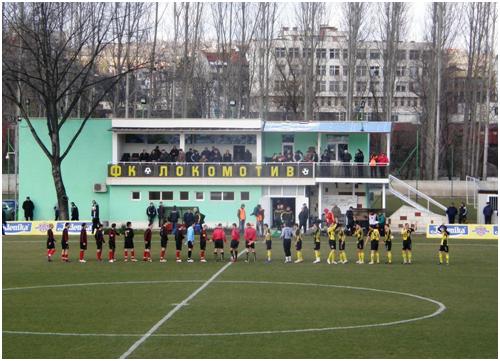
Home Fans Side Mezdra
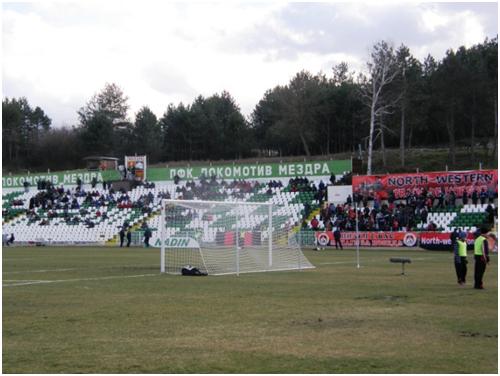
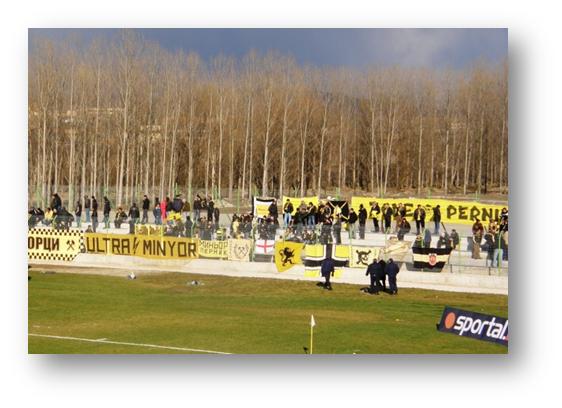
Away End Mezdra
As with the previous day, the home side was to triumph by three goals to one, Minyor Pernik did attempt to play football and contributed to the match, but they were never good enough to challenge the home side, who are looking established with a position above mid-table in their first season at this level. We saw a crowd figure of just 250 for the game, but thought that Pernik brought at least that number themselves, (as they were bussed straight to the away end, we were uncertain if they had been made to pay). Our estimate put the crowd around the 1000 mark. It is difficult to be certain how accurate we were, but with wildly varying different figures on news and internet sources, I feel we are as accurate as any guess.
Returning to the town after the game, we went into the hotel restaurant, a large and truly cold dining hall. Although the meal itself was reasonable, and reasonably priced we were pleased to get out of such an unwelcoming place. No one else had chosen to eat there while we were there, and it is difficult to imagine someone doing so by choice, but as far as we could see, this was the only option in town to sit down and eat, the only other options being a few locally styled take-aways offering fare that was frightening to even look at.